14 Best Home Remedies For Chest Congestion + Causes
Clear your airways and breathe easy with the help of natural ingredients!

Image: shutter stock
Coughing, feeling uneasy due to phlegm, and clearing your throat frequently are signs of chest congestion that can be annoying and unpleasant.
Unfortunately, millions of individuals are affected by this respiratory problem, which can be easily managed at home with natural treatments.
Even though medical institutions have issued repeated warnings, many people do not take chest congestion seriously. It affects the mucus lining of your respiratory system. This inflammation causes an excessive amount of mucus to be produced. When the mucus is expelled as phlegm, it is usually a good indication since it means the body is safeguarding itself by eliminating hazardous irritants and bacteria mixed with mucus. However, chest congestion occurs when high mucus output does not return to normal levels.
We have discussed the signs, causes, and symptoms of chest congestion, as well as some home remedies for it, in this article. Take a look!
In This Article
What Causes Chest Congestion?
Some common irritants and health problems that lead to excessive mucus production and chest congestion are:
- Cigarette smoke
- Diseases like flu, bronchitisi An inflammatory condition where the bronchial tube lining gets filled with mucus and inflamed, causing shortness of breath and cough. , tuberculosis, and pneumonia
- Gastroesophageal acid reflux (GERD)i A digestive condition where the stomach acid irritates the lining of the food pipe, causing heartburn and throat issues.
- Allergies
- Asthma
Congestive heart failure is a rather uncommon but serious condition that is characterized by lung congestion due to the accumulation of fluids
. More often than not, simple upper respiratory tract infections are the cause of chest congestion. Here are the symptoms associated with it.
Signs And Symptoms Of Chest Congestion
If you are suffering from chest congestion, you will probably experience
- Chest pain while coughing
- Wheezing or rasping
- Coughing fits
- Headache
- Shortness of breath
- Phlegm
- Postnasal drip
- Tiredness due to lack of sleep
- Coughing up blood (in extreme cases) (1)
Though these symptoms seem minor, it is not wise to allow them to linger for too long. Chest congestion that lasts for more than 14 days can indicate some serious underlying illnesses. It is best to treat it with home remedies, starting from day three or four itself. However, consult a doctor without delay if the congestion continues even after 14 days.
More often than not, simple upper respiratory tract infections are the cause of chest congestion. Using some home remedies for chest congestion may help manage symptoms of conditions like bronchitis. Here are some home remedies to get you started on the easy road to recovery. Easy because they are easy-to-make and affordable.
How To Get Rid Of Chest Congestion
- Apple Cider Vinegar
- Essential Oil
- Teas
- Honey
- Heating Pad
- Ginger
- Mustard Poultice
- Onion Remedy
- Epsom Salt Bath
- Pineapple Juice Or Lemon Juice
- Steam Inhalation
- Turmeric
- Thyme Herb
- Coffee
Home Remedies For Chest Congestion
1. Apple Cider Vinegar For Chest Congestion

You Will Need
- 1 tablespoon apple cider vinegar
- A cup of warm water
What You Have To Do
Dilute the vinegar in water and gargle with this.
How Often You Should Do This
Repeat this twice a day for best results.
Why This Works
“Some believe that vinegar attracts the excess phlegm and may help one expel it after the gargle. Research shows that ACV had only 2% success rate in clearing out excess phlegm when compared with other drugs or methods of treatment (2). More studies in this regard are warranted.”
2. Essential Oil For Chest Congestion

You Will Need
- 2-3 drops eucalyptus oil OR tea tree oil OR peppermint oil
- 1 tablespoon coconut oil OR castor oil
What You Have To Do
- Mix the essential oil of your choice with any of the carrier oils.
- Apply this blend to the sinuses, neck, chest, and back.
- Leave it on for a couple of hours.
How Often You Should Do This
Repeat this once every day, preferably before going to bed.
Why This Works
No matter which essential oil you decide to use, all of them possess a certain set of similar properties and are a good remedy for chest congestion. These properties include mucus reduction, anti-inflammatory for the inflamed respiratory passages, and antimicrobial against the infection causing the congestion (3, 4, 5).
3. Fenugreek Tea For Chest Congestion
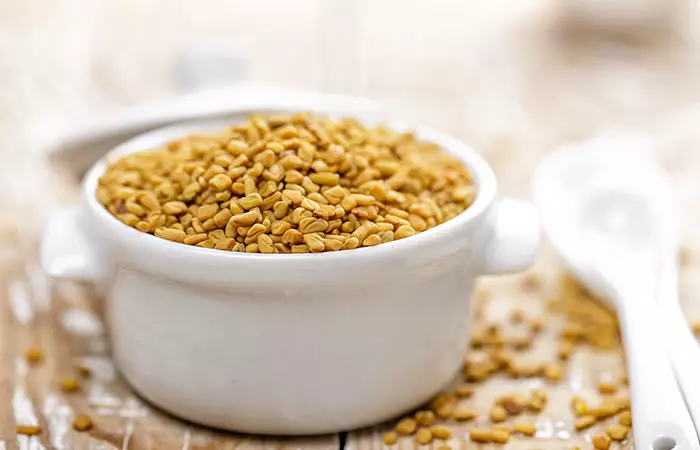
You Will Need
- 1 teaspoon fenugreek seeds
- A cup of water
- 1 teaspoon honey
What You Have To Do
- Soak the fenugreek overnight in a cup of water.
- In the morning, strain the liquid and heat it up.
- Add honey and drink this herbal tea.
How Often You Should Do This
Drink a cup or two of this every day until the congestion goes away.
Why This Works
The anti-inflammatory properties of fenugreek help to reduce the inflammation in the respiratory tract.
The antimicrobial compounds present in it deal with the infection-causing organisms and eliminate them (6).
4. Honey For Chest Congestion

You Will Need
- 1 tablespoon honey
- 1 tablespoon lemon juice
- A glass of hot water
What You Have To Do
Add the honey and lemon juice to the hot water and drink this mixture.
How Often You Should Do This
Have one glass in the morning and one glass in the evening to relieve chest congestion quickly.
Why This Works
Honey is antimicrobial in nature and can help you get rid of the respiratory tract infection. It also soothes the irritated throat and reduces coughing (7).
5. Heating Pad For Chest Congestion

You Will Need
A heating pad or hot water bottle
What You Have To Do
Place this on the chest for 10-15 minutes.
How Often You Should Do This
Repeat if required.
Why This Works
The warmth from the heating pad can help break down the accumulated mucus so that it can easily be eliminated.
6. Ginger For Chest Congestion
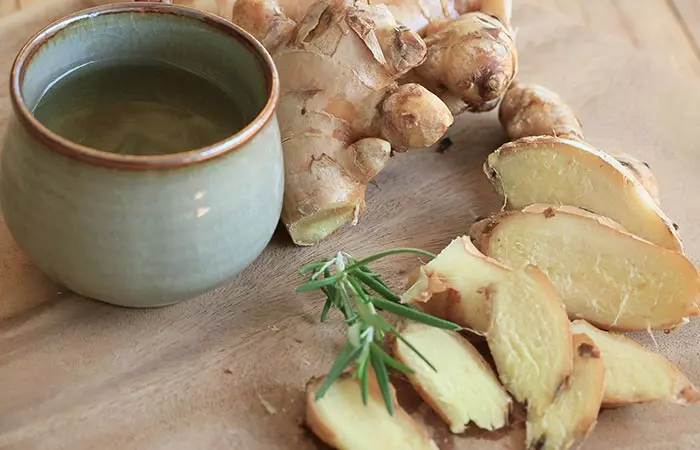
You Will Need
- 1-inch piece of ginger
- A cup of boiling water
- 1 teaspoon honey
What You Have To Do
- Chop the ginger and soak it in hot water for 4-5 minutes.
- Strain this and add honey to it. Mix well.
- Consume this herbal tea while it is warm.
How Often You Should Do This
Have 2-3 cups of ginger tea in a day.
Why This Works
The hotness of the tea can alleviate the symptoms of chest congestion by clearing up your airways. Ginger acts as an expectoranti A class of cough medicines or agents that help loosen the mucus from the airways by increasing the water content of the mucus. and antimicrobial agent. It reduces the phlegm to a great extent, and in cases where this congestion is due to a respiratory infection, the active phytochemicalsi Bioactive nutrients found in plants that help resist plant virus infections, fungi, and other insects. found in ginger kill the harmful microorganisms (8). This is one of the most effective home remedies for phlegm (mucus), as it helps clear mucus from the respiratory system.
7. Mustard Poultice For Chest Congestion
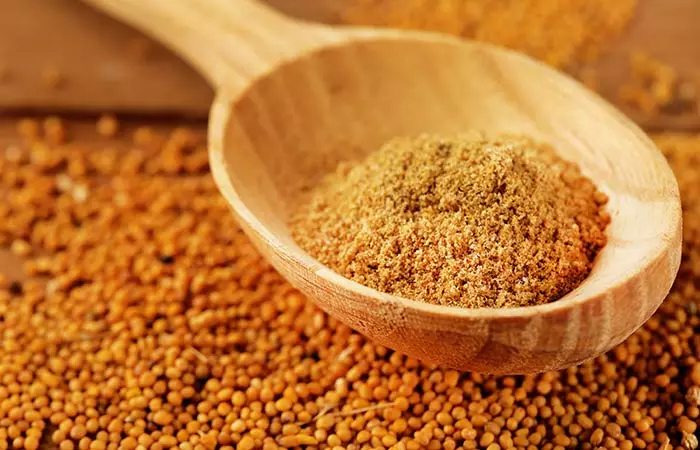
You Will Need
- 1/4 cup mustard powder
- 1 cup flour
- 2 pieces of cloth (big enough to cover the chest)
- Hot water
- Coconut oil OR olive oil
What You Have To Do
- Mix the mustard powder and flour and then add water to get a smooth paste.
- Apply coconut oil or olive oil on the chest.
- Dip a cloth piece in hot water. Wring out the excess and place this on the chest.
- Over this, evenly spread a thin layer of the mustard powder-flour paste.
- Wet the second piece of the cloth in hot water and place it on the paste.
- Leave this on for about 15 minutes.
- Remove and rinse the area clean with normal water.
How Often You Should Do This
Repeat this after a day or two if required.
Why This Works
Mustard stimulates circulation and increases perspiration, causing the airways to clear up and relieving chest congestion (9).
Caution
If you feel any discomfort, irritation, or burning sensation, remove the poultice immediately.
8. Onion Remedy For Chest Congestion
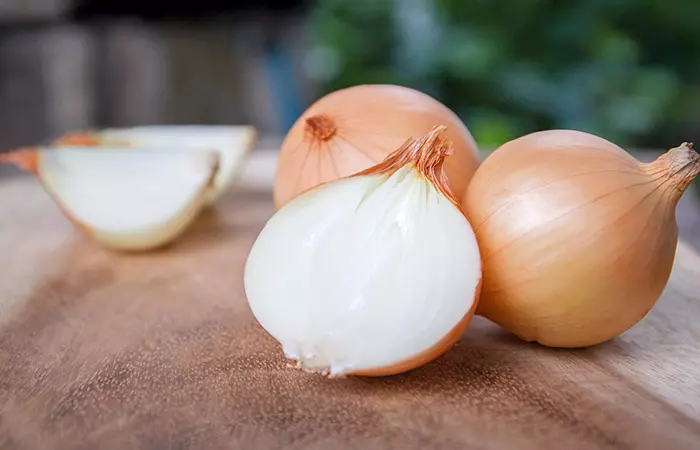
You Will Need
- 1 small onion
- 1 teaspoon lemon juice
- 1 teaspoon water
- 1/2 teaspoon honey
What You Have To Do
- Mix everything well and slightly heat it up.
- Consume this mixture.
How Often You Should Do This
Have this mixture thrice daily.
Why This Works
Never imagined you’d read about onions here, did you? Well, onion immediately soothes your aching throat and relieves chest congestion (10).
9. Epsom Salt Bath For Chest Congestion
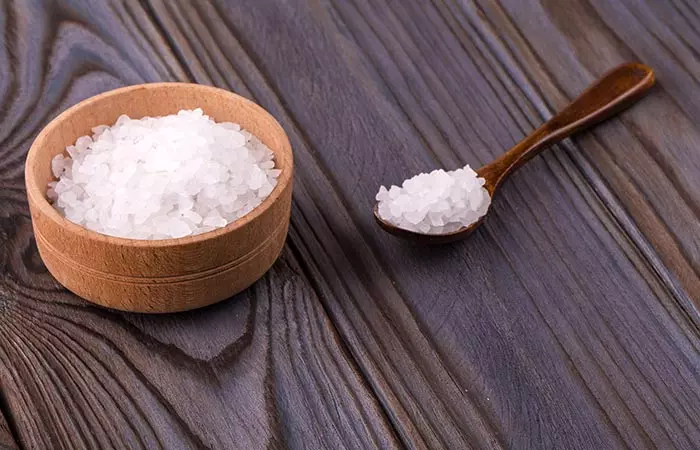
You Will Need
- 1-2 cups Epsom salt
- Warm water
- A bathtub
What You Have To Do
- Draw a bath and add Epsom salt to the bath water.
- Soak in this for 20 minutes and then rinse your body with plain water.
- If you do not have a bathtub, add Epsom salt to warm water in a bucket and shower with this.
How Often You Should Do This
If you do not get relief after soaking in this after the first time, do it once again after a day.
Why This Works
Epsom salt draws out all the toxins from the body and relaxes your muscles and joints (11). The warmth of the bath water will decongest the mucus.
10. Pineapple Juice For Chest Congestion

You Will Need
1 glass fresh pineapple juice
What You Have To Do
Drink this with your meals or in between meals.
How Often You Should Do This
Have a glass or two of pineapple juice every day.
Why This Works
Pineapple is known to clear up the airways with its anti-inflammatory, detoxifying, and cleansing properties (12).
Caution
Do not drink canned pineapple juice as it is stripped of the wonderful vitamin C content that this fruit originally contains.
11. Steam Inhalation For Chest Congestion

You Will Need
- A bowl of hot water
- A few drops of eucalyptus oil (optional)
- A towel
What You Have To Do
- Add the eucalyptus oil to the water.
- Lower your face over this bowl and cover your torso over it entirely with a sheet or towel. Don’t allow any outside air to enter this makeshift ‘face-tent’ as it will create further congestion.
- Deeply inhale the steam for about 10 minutes.
- Alternatively, you could place a few drops of eucalyptus oil in the path of water in the shower. Stand in the hot shower and inhale the steam!
How Often You Should Do This
Do this preferably before going to bed. Repeat 1-2 times during the day.
Why This Works
Deep inhalation of steam is an easy and more convenient alternative to a hot, steamy bath. You will experience immediate relief from congestion, headache, and postnasal drip (13). This is a good way to end a day full of chest congestion.
Caution
When you sleep after steam treatment, cover your head and forehead as it will prevent cold air from coming in contact with the face and creating discomfort.
 Quick Tip
Quick Tip[ Here Is A Video For “>Chest Congestion Relief ]
12. Turmeric For Chest Congestion
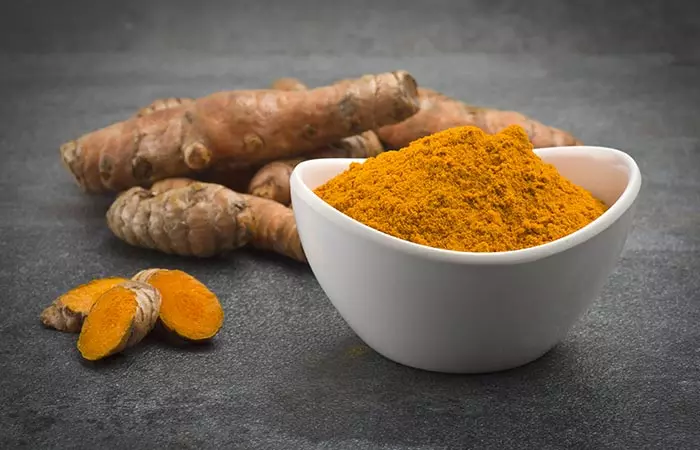
You Will Need
- ½ teaspoon turmeric powder
- ½ teaspoon black pepper powder
- 1 tablespoon honey
What You Have To Do
Another natural way to get rid of congestion fas is to make a thick paste by mixing the above ingredients and lick it to ease the discomfort of chest congestion.
How Often You Should Do This
Do this whenever you experience discomfort.
Why This Works
Turmeric has strong antibacterial properties and is an excellent healing agent (14). Black pepper acts as an expectorant and a decongestant (15). This mixture is very convenient to carry around in a small bottle or jar and can be of great help during the day.
13. Thyme Herb For Chest Congestion
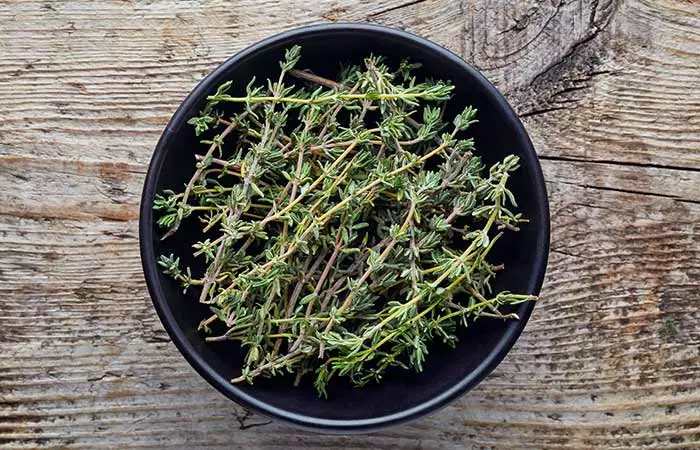
You Will Need
- 2 teaspoons dried thyme
- A cup of hot water
What You Have To Do
- Soak the thyme in hot water for a few minutes.
- Strain and drink this herbal tea.
How Often You Should Do This
Drink 2-3 cups of thyme tea in a day.
Why This Works
Thyme is an expectorant and antimicrobial agent that is commonly used to treat cold symptoms like chest congestion (16).
You can also use garlic extracts and supplements to soothe congestion. Studies have shown that garlic may help alleviate fever, headache, sinus congestion, cough, common cold, and asthma among other health issues (17).
14. Coffee
You Will Need
- 1 cup of hot black coffee
- Honey (optional)
What You Have To Do
- Brew a cup of hot black coffee. Add honey, if desired.
- Drink the coffee while it’s warm.
How Often You Should Do This
Enjoy a cup of black coffee 1-2 times a day, especially in the morning or whenever you experience chest congestion.
Why This Works
The caffeine in the coffee acts as a bronchodilator. It helps open up the airways and alleviates chest congestion. Some research suggests that caffeine may briefly help improve airway function in asthma patients (18). Additionally, the caffeine also has mild anti-inflammatory effects and may help soothe the respiratory tract (19).
Aside from these herbal remedies, daily salt water gargle may help clear the congestion and expel excess mucus. It is also important to get enough rest and maintain optimal hydration levels to recover quickly.
 Quick Tip
Quick TipThere is an additional tip you can follow apart from trying these home remedies. If your chest congestion is caused by a medical condition, like asthma, make sure to watch what you eat. Samir S, a blogger, shares how his father manages asthma and the impact of fast food consumption on asthma attacks. The physician identified severe chest congestion and prescribed antibiotics and a nebulizer treatment. He notes, “Fast food increases inflammation in the body which profoundly affects the lungs and can trigger asthma attacks… After the nebulizer treatment and course of antibiotics, my dad felt much better and I am positive that much of his relief was also due to him stopping his consumption of fast food (i).”
Infographic: How to Avoid Contracting & Passing Chest Congestion
Boosting and maintaining your immune system is the best way to prevent chest congestion. So, you can follow the simple tips mentioned in the infographic below to strengthen your immunity. We have also included some easy hygiene tips to lessen your risk of contracting a cold or the flu and minimize the risk of you spreading it to others. Keep scrolling! Illustration: StyleCraze Design Team
Chest congestion is a condition in which the body produces excessive amounts of mucus. Triggers for high loads of mucus production include cigarette smoke, allergies, asthma, upper respiratory tract infections, GERD, and certain medical conditions like pneumonia and tuberculosis. Fits of coughing, phlegm, chest pain and heaviness, shortness of breath, wheezing, and headaches are some of the common symptoms that indicate chest congestion. Learning how to stop coughing may also provide relief from persistent chest congestion. Home remedies like essential oils, herbal teas, mustard poultice, turmeric, ginger, and steam inhalation may effectively decongest the respiratory system, improve breathing, and alleviate symptoms like sore throat and coughing. In addition, it is essential to drink plenty of fluids and water to stay hydrated.
Frequently Asked Questions
How long does chest congestion last?
Chest congestion rarely goes away by itself. Using chest congestion home remedies, and consuming hot soups, and herbal teas can help speed up the process. If the congestion lasts longer than 14 days, consult a doctor immediately.
Foods to avoid chest congestion?
• Dairy products
• Foods high in sugar and salt
• Junk and fried food
• Fatty and processed meat
• Preserved foods
• White pasta and other refined grains
Can sinus infections cause chest congestion?
Sinus infections caused due to bacteria or viruses often have chest congestion as an associated symptom.
Despite using the chest congestion remedies listed above, if there is no improvement in your condition after two weeks, consult a doctor if your chest congestion is accompanied by any or most of the following symptoms:
• Sudden appearance of reddish or yellow sputum
• Fever and chills
• Gasping for breath
• A feeling of tightness in the chest
How do you sleep with chest congestion?
If you have chest congestion, try to sleep on your side and keep your pillows at a slightly higher angle to elevate yourself and prevent congestion from disrupting your sleep.
Why is chest congestion worse at night?
Chest congestion often worsens at night while lying on the bed as the mucus pools in the back of the throat and causes coughing.
Is it better to lie down or sit up with chest congestion?
It is best to sit up if you have chest congestion as it prevents the mucus from building up in your throat.
Is chest congestion contagious?
No, chest congestion is not contagious. However, if you are coughing and sneezing along with congestion, you can pass it on to others.
Key Takeaways
- Smoking, allergies and respiratory conditions can lead to congestion in your chest.
- Simple home remedies such as a warm cup of herbal tea or a gargle with apple cider vinegar can provide immediate relief.
- You can also apply diluted essential oils to your chest, back and sinuses to clear the respiratory passages.
- However, if your symptoms are not cured with the suggested home remedies, get in touch with a health professional.
Chest congestion accounts for the loss of millions of man-hours each year. Sadly, most people continually choose to consider it as just a seasonal annoyance without giving a single thought to its possible consequences. The simple remedies in this article work for most people by providing quick relief. But, it is best to adopt the home remedies that work for you as lifelong practices to prevent chest congestion even before it occurs.
Do you know of any other remedies on how to get rid of chest congestion? If yes, do share with us by leaving a comment below.
You can naturally treat chest congestion with simple and convenient Ayurvedic home remedies. Watch the video to learn more about these traditional solutions that are safe and effective.
Personal Experience: Source
StyleCraze's articles are interwoven with authentic personal narratives that provide depth and resonance to our content. Below are the sources of the personal accounts referenced in this article.
i. My Dad Had Severe Chest Congestion. Here Are 2 Things He Did to Fix It.https://medium.com/in-fitness-and-in-health/my-dad-had-severe-chest-congestion-here-are-2-things-he-did-to-fix-it-6393e5fade9a
Read full bio of Dr. Abby Kramer
Read full bio of Arshiya Syeda
Read full bio of Dipti Sharma






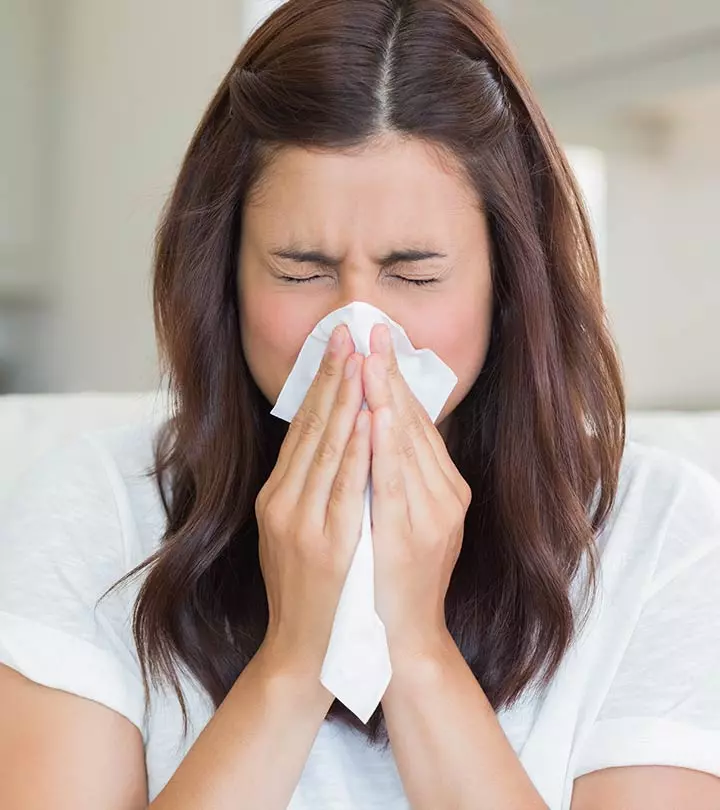


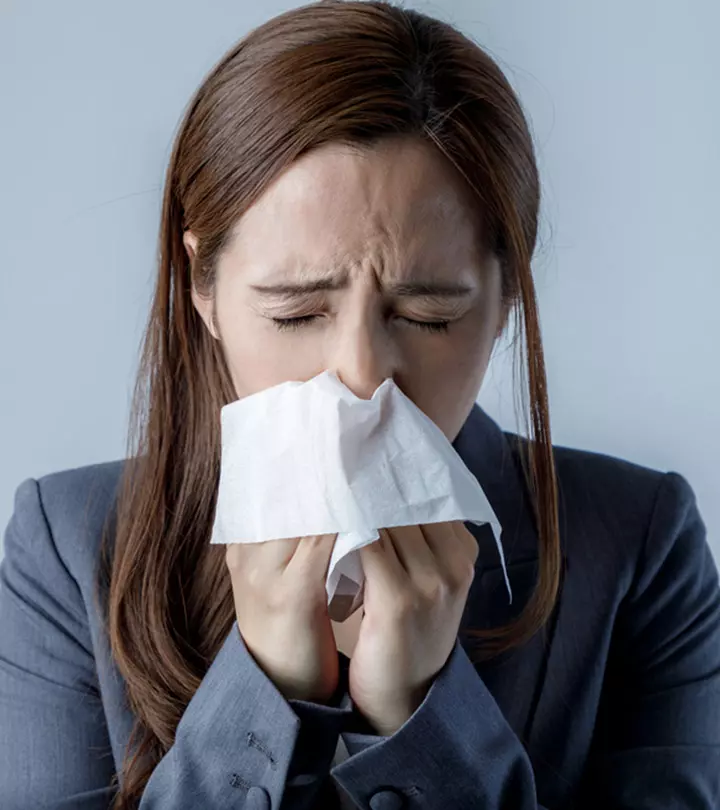

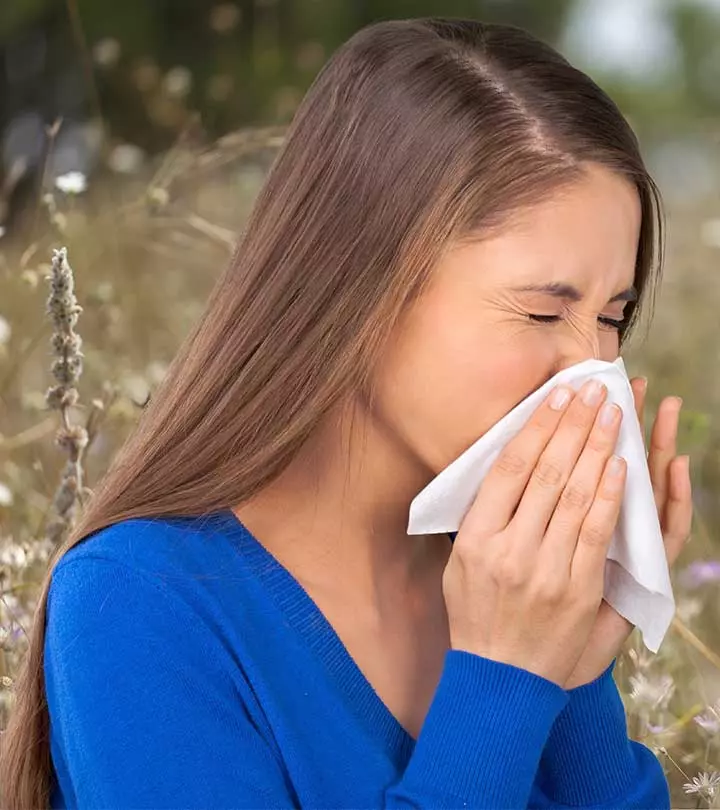














Community Experiences
Join the conversation and become a part of our empowering community! Share your stories, experiences, and insights to connect with other beauty, lifestyle, and health enthusiasts.